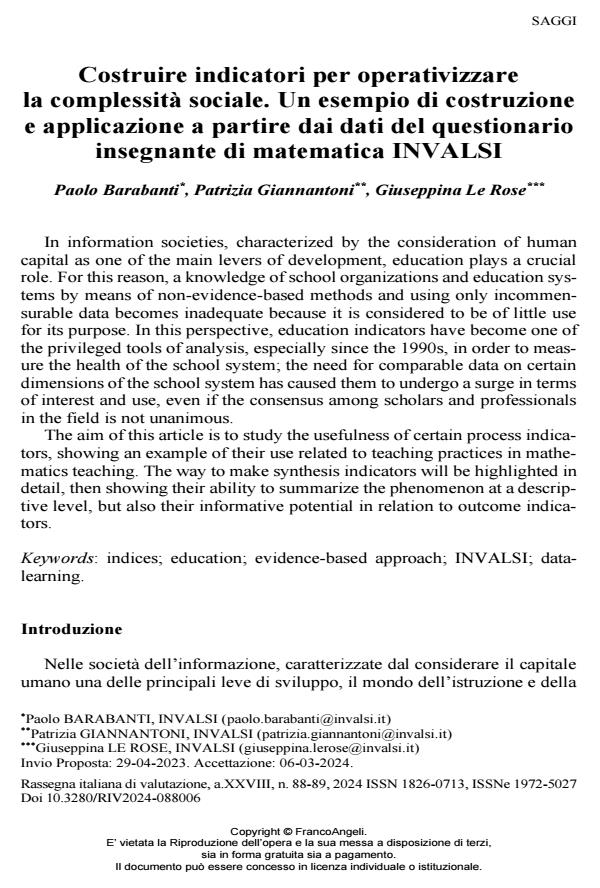Costruire indicatori per operativizzare la complessità sociale. Un esempio di costruzione e applicazione a partire dai dati del questionario insegnante di matematica INVALSI
Journal title RIV Rassegna Italiana di Valutazione
Author/s Paolo Barabanti, Patrizia Giannantoni, Giuseppina Le Rose
Publishing Year 2024 Issue 2024/88-89
Language Italian Pages 19 P. 102-120 File size 379 KB
DOI 10.3280/RIV2024-088006
DOI is like a bar code for intellectual property: to have more infomation
click here
Below, you can see the article first page
If you want to buy this article in PDF format, you can do it, following the instructions to buy download credits

FrancoAngeli is member of Publishers International Linking Association, Inc (PILA), a not-for-profit association which run the CrossRef service enabling links to and from online scholarly content.
In information societies, characterized by the consideration of hu-man capital as one of the main levers of development, education plays a crucial role. For this reason, a knowledge of school organizations and education systems by means of non-evidence-based methods and us-ing only incommensurable data becomes inadequate because it is con-sidered to be of little use for its purpose. In this perspective, education indicators have become one of the privileged tools of analysis, espe-cially since the 1990s, in order to measure the health of the school sys-tem; the need for comparable data on certain dimensions of the school system has caused them to undergo a surge in terms of interest and use, even if the consensus among scholars and professionals in the field is not unanimous. The aim of this article is to study the usefulness of certain process indicators, showing an example of their use related to teaching practic-es in mathematics teaching. The way to make synthesis indicators will be highlighted in detail, then showing their ability to summarize the phenomenon at a descriptive level, but also their informative potential in relation to outcome indicators.
Keywords: indices; education; evidence-based approach; INVALSI; da-ta-learning.
Paolo Barabanti, Patrizia Giannantoni, Giuseppina Le Rose, Costruire indicatori per operativizzare la complessità sociale. Un esempio di costruzione e applicazione a partire dai dati del questionario insegnante di matematica INVALSI in "RIV Rassegna Italiana di Valutazione" 88-89/2024, pp 102-120, DOI: 10.3280/RIV2024-088006